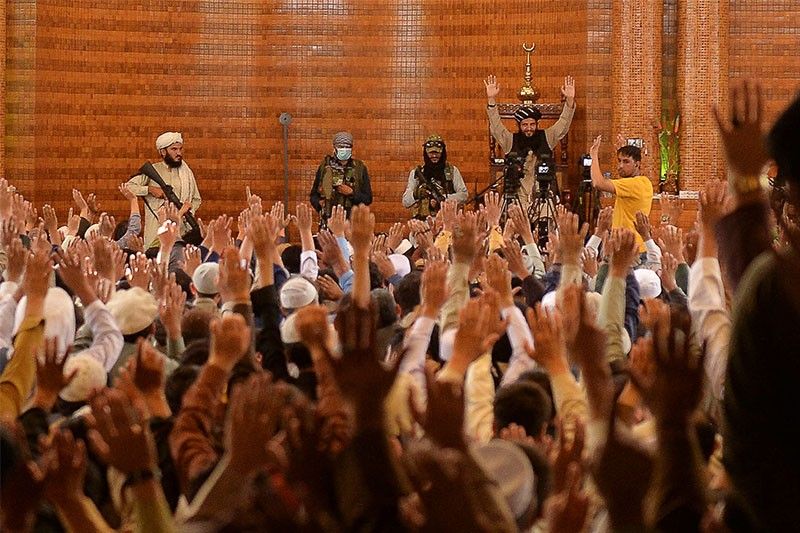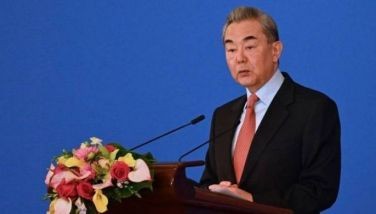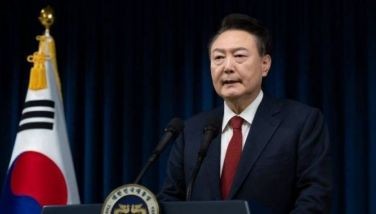Timeline: Taliban's takeover of Afghanistan

PARIS, France — Here are the main developments since the Taliban seized Kabul, taking power again in Afghanistan after two decades of war.
Lightning takeover
On August 15, Taliban fighters appear on the edge of Kabul after a lightning offensive launched in May as US and NATO troops began to withdraw.
In the space of 10 days, they seized city after city across the country with little or no resistance.
Television images show the Taliban taking the presidential palace.
President Ashraf Ghani flees the country and says on Facebook that the "Taliban have won" and that he left to avoid a "flood of bloodshed".
Airport chaos
Frightened people besiege Kabul airport, the only exit route from the country. Chaos breaks out on the tarmac as people try to rush aircraft.
All military and civilian flights are halted, before resuming Monday evening.
'Terrorism sanctuary' fears
China becomes the first country to say it is ready to deepen "friendly and cooperative" relations with the Taliban.
It later accuses Washington of "leaving an awful mess".
The UN Security Council says the country must not become a breeding ground for terrorism.
Under growing criticism, President Joe Biden insists he has no regrets and emphasises that US troops cannot defend a nation whose leaders "gave up and fled".
Go back to work
The Taliban tell civil servants in Kabul to resume their duties "without any fear". Some shops reopen and evacuation flights from the city's airport restart.
'Women can work'
At their first news conference since seizing power, spokesman Zabihullah Mujahid says the Taliban will let "women work in accordance with the principles of Islam".
Girls return to school in Taliban-held Herat.
EU 'must talk' to Taliban
EU foreign policy chief Josep Borrell says the bloc will have to talk to the Taliban.
ICC: Possible violations
Karim Khan, chief prosecutor of the International Criminal Court, says reported crimes during the Taliban advance may amount to violations of international law.
House-to-house hunt
After the Taliban kill a relative of a journalist for the German state broadcaster as they search for the reporter, a UN intelligence report Friday says militants have been conducting "targeted door-to-door visits" searching for opponents and their families.
A German civilian is also shot on his way to Kabul airport.
'Collapse' of Afghanistan
Russian President Vladimir Putin calls on the global community to prevent the "collapse" of Afghanistan following the Taliban takeover.
NATO says its allies have deployed enough planes to airlift foreign nationals and their Afghan colleagues from Kabul but ground access to the airport is a "big challenge".
Taliban leader returns
Within hours of Taliban co-founder Mullah Abdul Ghani Baradar returning to Afghanistan, the group says it will be "different" this time. It will pardon its enemies and women will not have to wear the all-enveloping burqa.
'Difficult' airlift
Biden says he cannot guarantee the final outcome of the emergency evacuation from Kabul's airport, calling it one of the most "difficult" airlift operations ever.
The US tells its citizens to avoid travelling to the airport because of "potential security threats" near its gates.
Pressure builds on Biden to extend his August 31 deadline to complete the rescue missions, with EU foreign policy chief Josep Borrell saying "it's mathematically impossible" to evacuate by that date.
Seven deaths
Britain's defence ministry says that seven Afghans died in crowds in Kabul, without giving the circumstances. The previous day Sky News aired footage of at least three bodies outside the airport.
Taliban blames US
The Taliban blames the US for the dramatic scenes at Kabul airport, an official saying that "there is peace and calm all over the country, but there is chaos only at Kabul airport".
Resistance?
There have since been flickers of resistance with some ex-government troops gathering in the Panjshir Valley, north of Kabul.
The National Resistance Front is prepared for a "long-term conflict" but is also still seeking to negotiate with the Taliban about an inclusive government, the movement's spokesman Ali Maisam Nazary tells AFP.
Taliban fighters
Hundreds of Taliban fighters are heading to the Panjshir valley "to control it, after local state officials refused to hand it over peacefully", the group wrote on its Arabic Twitter account.
G7 summit
G7 leaders will discuss the crisis on Tuesday at a virtual summit, Britain's Prime Minister Boris Johnson announced on Sunday.
"It is vital that the international community works together to ensure safe evacuations, prevent a humanitarian crisis and support the Afghan people to secure the gains of the last 20 years," Johnson tweeted.
Get the latest news as Taliban gains control of Afghanistan. Photo courtesy of Al Jazeera/AFP
Afghanistan's supreme leader said Sunday the country's women were being saved from "traditional oppressions" by the adoption of Islamic governance and their status as "free and dignified human beings" restored.
In a statement marking this week's Eid al-Adha holiday, Hibatullah Akhundzada -- who rarely appears in public and rules by decree from the Taliban's birthplace in Kandahar -- said steps had been taken to provide women with a "comfortable and prosperous life according to Islamic Sharia".
The United Nations expressed "deep concern" last week that women were being deprived of their rights under Afghanistan's Taliban government and warned of systematic gender apartheid.
Since returning to power in August 2021, Taliban authorities have stopped girls and women from attending high school or university, banned them from parks, gyms and public baths, and ordered them to cover up when leaving home.
They have also barred them from working for the UN or NGOs, while most female government employees have been dismissed from their jobs or are being paid to stay at home.
However, Akhundzada said "necessary steps have been taken for the betterment of women as half of the society".
"All institutions have been obliged to help women in securing marriage, inheritance and other rights," his statement read. — AFP
UN chief Antonio Guterres will gather international envoys at a secret location in Doha on Monday in an increasingly desperate bid to find ways to influence Afghanistan's Taliban rulers. — AFP
The UN Security Council adopted a resolution Thursday calling on Taliban authorities to "swiftly reverse" all restrictive measures against women, condemning in particular its ban on Afghan women working for the United Nations.
The resolution, unanimously adopted by all 15 Council members, said the ban announced in early April "undermines human rights and humanitarian principles."
More broadly, the Council called on the Taliban government to "swiftly reverse the policies and practices that restrict the enjoyment by women and girls of their human rights and fundamental freedoms."
It cited access to education, employment, freedom of movement, and "women's full, equal and meaningful participation in public life."
The Council also urged "all States and organizations to use their influence" to "promote an urgent reversal of these policies and practices." — AFP
G7 foreign ministers on Tuesday demanded the "immediate reversal" of a ban on women in Afghanistan working for non-governmental organisations and the United Nations.
"We call for the immediate reversal of unacceptable decisions restricting human rights and fundamental freedoms, including the latest bans prohibiting Afghan women from working for NGOs and the UN," the top diplomats said in a statement after two days of talks in Japan.
The group also slammed the Taliban authorities' "systematic abuses of human rights of women and girls and discrimination against the members of religious and ethnic minorities".
Taliban authorities triggered international outrage this month after extending a December ban on Afghan women working for non-governmental organisations to include the UN.
They have rejected criticism over the move, saying it is an internal issue that should be "respected by all sides." — AFP
The United Nations is being forced to make an "appalling choice" over whether to continue operations in Afghanistan while the Taliban government bans women from working for the organisation, the world body says.
Under their austere interpretation of Islam, Taliban authorities have imposed a slew of restrictions on Afghan women since seizing power in 2021, including banning them from higher education and many government jobs.
In December, they banned Afghan women from working for domestic and foreign non-governmental organisations, and on April 4 extended that to UN offices across the country.
In a statement Tuesday, the UN mission in Afghanistan said the ban was "unlawful under international law, including the UN Charter, and for that reason the United Nations cannot comply".
"Through this ban, the Taliban de facto authorities seek to force the United Nations into having to make an appalling choice between staying and delivering in support of the Afghan people and standing by the norms and principles we are duty-bound to uphold," it said. — AFP
- Latest
- Trending


































